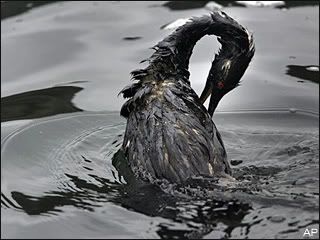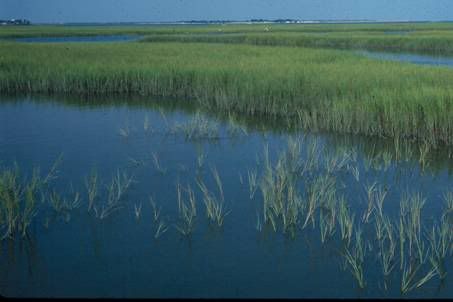
Oil is like blood to society. We have to have it and we have to keep it pumping through the arteries and veins of social infrastructure. In another way this oil in the gulf is like blood, like a gash sliced in the heart of the heart and it's life blood is leaking out and it's the bleeding to death. But here the pretty metaphor breaks down. No danger the earth will bleed to death. The danger is the oils will pollute the oceans. Everyone is afraid to say it but it seems not a far fetched conclusion that the gulf is ruined forever. The wonderful wetlands and marshes of Louisiana are probably doomed. It's just a matter of time before it kills the entire Gulf and Caribbean. If they stopped it right now the damage is done. But they wont stop it until August.
Grist: "Louisiana Marshes hit by gulf Oil slick Wildlife threatened."
With some of the worst fears of environmental disaster being realized in the marshlands of the Mississippi Delta, BP was also forced to concede it had underestimated the amount of oil leaking into the Gulf of Mexico.
The British energy giant had always maintained that only 5,000 barrels -- or 210,000 gallons -- of crude was gushing each day from a pipe ruptured when its Deepwater Horizon rig exploded one month ago and sank.Now serious is this gonna be, pretty damn serious:
(America's Wetlands: Resource Center)
Louisiana has 40% of the coastal wetlands of the continental United States. This translates to about 7,000 square miles of some of the most diverse habitats in the world.The oil is going to ruin 40% of Americas coastal wetlands?

salt marsh
Salt Marsh. This is marsh that is inundated daily with salt water tides. There are few species that characterize this habitat because they are in regular contact with salt water. In fact, the principal plant is Oyster Grass (Spartina alterniflora). One can drive for miles through salt marsh and feel that one is seeing only one species of grass for as far as the eye can see. There are a few other species that can withstand the salt water. One of these in coastal Louisiana is Black Mangrove. Animals are least diverse in salt marsh, but those that are there are really neat. Periwinkles (snails) crawl up and down the Oyster Grass feeding on algae. Ribbed mussels close up during low tide and open and feed during high tide. Fiddler crabs abound, and clumps of oysters are common. Elusive Clapper Rails dart in and out of the dense vegetation, and the occasional Seaside Sparrow may flutter up in a ritualistic dance.
The only other wetland habitats encountered in coastal Louisiana are the open estuaries (bodies of water where fresh water from rivers mixes with salt water from the sea), beaches and barrier islands, and the open Gulf of Mexico. Each of these is quite diverse and very important to the economy, health, and culture of our region.
Of course that's exactly what's getting killed by oil now.
When we talk about Civilization people usually think civilization is freeways and flush toils and tall buildings. The cast aways on Gilligan's Island spoke "when we get back to Civilization." Those things are not civilization. According to Albert Schweitzer (Philosophy of Civilization) Civilization is the ideas that organize and motive living arrangements. The flush toilets and so super highways and tall buildings are just the infrastructure. The ideas of civilization have died, thus the infrastructure is all that's left, just the outer husk. what killed the ideas of Civilization?
Human sin killed civilization. People want to feather their nests. Its' an outgrowth of self transcendence. We can project into the future and calculate what will happen if we don't secure ourselves, so we work to do that and we wind up running over other people to get secure. When we concoct ways as s society to make this possible for elites on a mass scale that is the social dimension to sin.
The oil thing is just the latest, the oil is the chickens coming home to roust. What was the status of the wetlands before the rupture? What was happening with the marshes before the gash and the earth bleeding all over the oceans, and who cared?
Wildfowl
Five million ducks and a million geese come down to the Louisiana coast for the winter. They finish their molt into breeding plumage, choose mates, and, with a little luck, lay down some of the fat they'll need for spring migration and nesting. You could say that the foundation of next year's fall flight in the Mississippi Flyway rests on the bottomless black ooze of Louisiana's coastal marshes.
Which is one of the reasons waterfowl biologists and other conservationists are worried. The marshes are disappearing at the rate of more than 25 square miles a year. "We're on the verge of seeing an ecosystem collapse," says Phil Bowman, assistant secretary of the Office of Wildlife for the Louisiana Department of Wildlife and Fisheries. According to Bowman, Louisiana could lose 1,000 square miles of marsh in the next 50 years.
The Mississippi River has been adding land to Louisiana for millions of years. The result is more than 6,000 square miles of marshes from the eastern edge of the river's deltas to the low-lying Chenier Plains farther west. Forty percent of all the coastal marsh in the United States is here.
The Marshes were already on the skids and what were the Republicans and right wingers doing last summer while they had Obama on the ropes over the health care? Where they concerned about the marshes then? They are certainly willing to blame Obama now. They are clamoring that Obama allowed this to happen. Prior to the March deicision to open rsearches to more drilling the Republicans were lambastinc Obama for not allowing Drilling, saying that it was costign us jobs we need the energy.
The truth of it is we have forgotten the ideals of civilization and all we have left is the infrastructure that was to make the ideals livable. Now the infrastructure, the helps to make it work have become the main thing, they have replaced the ideas. Because we are addicted to our comfort our views of Civilization center around our comfort and this blood our machines need to live must be taken from the earth. Human Greek put this gash in the earth and human greed is killing the earth. We have allowed the nobility of our dreams for humanity to die now like drug addicts who need a fix we are desperate to mainline some fossil fuel but the evil secret is we have to gash the earth to get it. We have to allow that gash to bleed into the pure water and kill a huge variety of living things.
That's the postmortem on our society, we have predicated our survival upon our own extinction. Think about this phrase. It bears repeating: we predicted our survive upon our own extinction. In other words to survive we have to die. What else could that possibly mean but that we are doomed.
This is my ultimate challenge to the atheists. I know many of my atheist friends are sick over what is happening. But basis in values can they give us other than reality is the hard concrete "what is," thus reality is not the ideas that would have kept Civilization alive reality is the hard concrete situation we face,not the dreams we dream. Those are "subjective" and unreal. If all you can ever base values upon is the nature of things what kind of values can you maintain when the world is dying?
With Civilization it would be a different story
If we understood the values of Civilization, if we did ot value short term profits over long progress, if we cared about the earth and about people the quality of life more than we do our personal combfort, if we were willing to sacrafice for the good of others here's what could be:
64% of states could supply 100% of their own renewable energy
(cleantecha.com)
Using just the resources that are currently commercially deployable; 31 of our 50 states, or 64% of US states could get 100% of their electricity from renewable sources in-state, and another 14 percent could generate 75 percent of their electricity in-state, according to a paper published by New Rules Project that focuses on the potential for local production.
a list of renewable resources from the same source reads like a litiny of alternative energy:
Pg 2 Wind
Pg 3 Off-shore Wind
Pg 4 Micro Hydro
Pg 5 Combined Heat & Power
Pg 6 Geothermal
Pg 7 EGS
Pg 8 Negawatts
Pg 9 Transmission Potential (my notes)
Pg 10 Relative Costs
All of these are ready to go we just need to the will to implement them.
Ocean Thermal Energy Conversion (we used to call it Ocean Thermal Gradient).
one thing that list leaves off is my favorite,Ocean Thermal, now call OTC (ocean thermal conversion). It's suing the temperature of the ocean to produce energy. That was a major case in college debate way back in the 70s, even back then the evidence existed to prove the technology would work.
OTEC
OTEC, or ocean thermal energy conversion, is an energy technology that converts solar radiation to electric power. OTEC systems use the ocean's natural thermal gradient—the fact that the ocean's layers of water have different temperatures—to drive a power-producing cycle. As long as the temperature between the warm surface water and the cold deep water differs by about 20°C (36°F), an OTEC system can produce a significant amount of power. The oceans are thus a vast renewable resource, with the potential to help us produce billions of watts of electric power. This potential is estimated to be about 1013 watts of baseload power generation, according to some experts. The cold, deep seawater used in the OTEC process is also rich in nutrients, and it can be used to culture both marine organisms and plant life near the shore or on land.
Instead of destroying the life of the Gulf those off shore plants could be producing clean energy that would never harm the environment from the renewable temperature of the ocean. Many more such innovations are possible, there's also the motion of ocean waves that can produce energy. But we don't have the political will to do it becuase it would elites giving up their personal power and Republicans would have to deny the rich their short term profits.
It's much easier to hypocritically blame Obama for the spill and when the Replicans are back in after this coming mid term election, they will be doing more drilling in the gulf and the American public wont remember a thing.

No comments:
Post a Comment